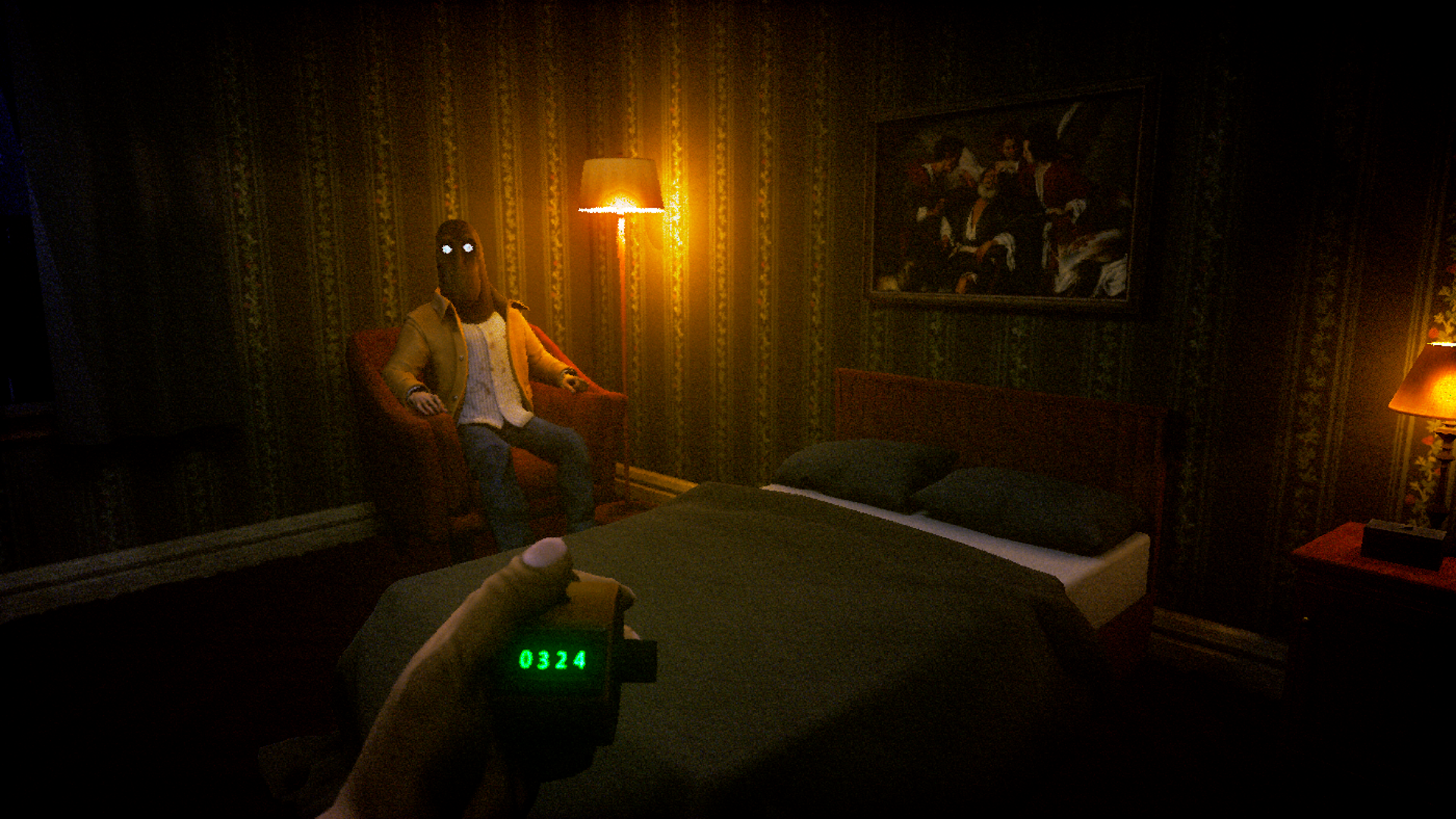A new viral game traps its users in a room with a mysterious figure goading them to keep clicking. Do we expect anything else from our perennially online, sexless and transactional times?
You stand in a motel room of meagre furnishings: a broken television; a few pieces of artwork; a thermostat. You’re free to leave whenever you want, but a strange, hooded figure, armchaired in the corner, dressed in jeans and a shirt with a concerningly splattered stain, has beckoned you for a particular task: reach 10,000 clicks on a handheld tally counter. He’s going to pay you $14,000 if you’re able to click until the numbers reset at 10,000 – so that’s precisely what you do. The eyes at the centre of its (his?) elongated, horselike head follow you wherever you walk. Think the Mona Lisa (early 1500s) as imagined by Boots Riley. As the tally goes up, the man reveals snippets of his life. You learn that he has a wife, and that he possesses a fondness for tigers. Sometimes he makes suggestive demands: click faster, slower, stop. Click somewhere else; don’t look at me. Clearly he’s getting off on this. Are you?
Clickolding is a 40-minute art game made by the experimental studio Strange Scaffold, whose idiosyncratic titles include Space Warlord Organ Trading Simulator (2021) and An Airport for Aliens Currently Run By Dogs (2021). It was made in just two months, a rarity in the world of videogames, where it is not unusual for production to last at least a handful of years. According to its director, Xalavier Nelson Jr, the idea germinated one night at this year’s Game Developers Conference in San Francisco, where he and a group of developers became obsessed with a tally counter. ‘It was just a deeply satisfying object,’ he recalled in an interview with Wired.
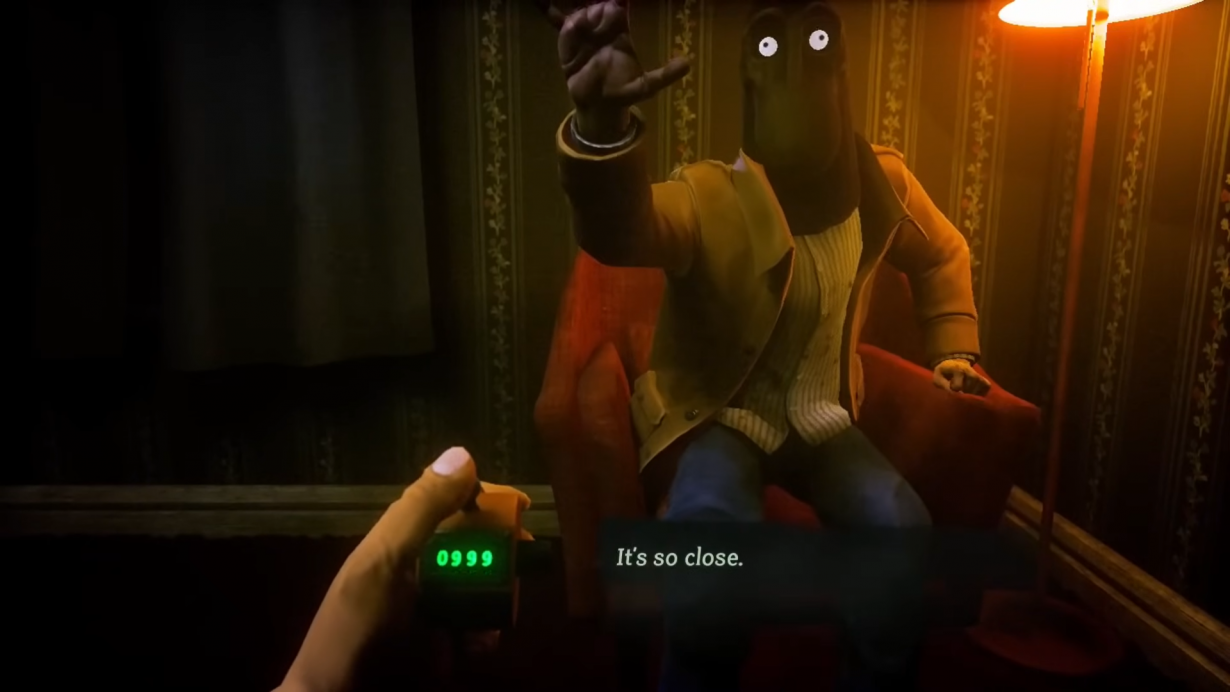
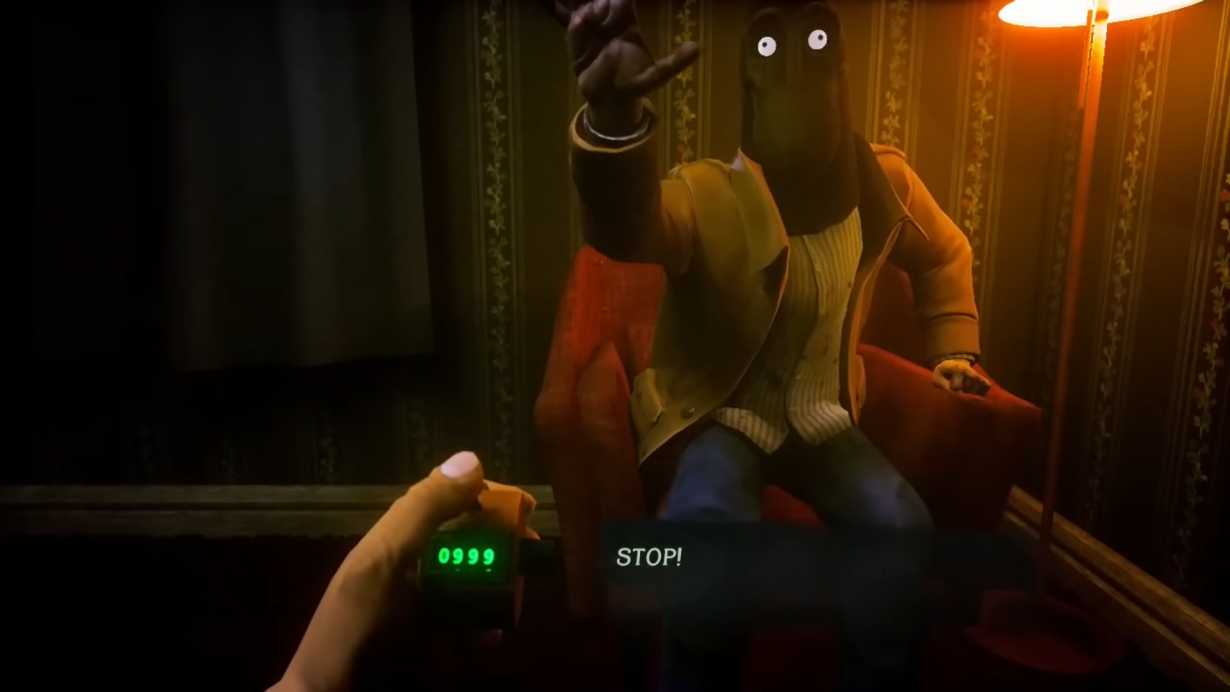
The title is perfect in its obviousness, riffing on the kink of cuckolding – where a person gets an erotic charge from watching their partner have sex with another person – and the clicking of said clicker. Of the latter, it offers a parody in the vein of Ian Bogost’s Cow Clicker (2010) and Frank Lantz’s Universal Paperclips (2017), works that satirise social-media games like FarmVille (2009) in which players perform endlessly repetitive tasks and accumulate resources (such as the titular cows or paperclips). But in Clickolding, all we are accruing is clicks. Sure, there is an undeniable pleasure in watching the numbers just go up, but the greater reward derives from the feedback afforded by your masked overseer, and the fleeting moments of delayed gratification he conjures. At click 999, just as you’re about to edge past 1,000, he commands you to stop. Hold it, he says, with a twinkle in his eye. What a thrilling moment of anticipation: I am a good boy – I do as I’m told.
It’s entirely right that this line should be drawn connecting mouse-clicking and transactional sex – indeed, fusing machinic rhythm with erotic desire. Tension and release define modern sex (to such an extent that edging, and the closely related gooning, are some of the most googled kinks now). You can hardly miss this dynamic while playing with the tally counter, the fleshy thumb pressing down, holding – holding – and then, finally, releasing to the soundtrack of that oh-so-pleasurable click.
Crucially, Clickolding evolves the satirical genre from forebears like Lantz who pushed the clicker genre into wide-eyed philosophical and cosmic territory. In that game, playing as an AI, you cure cancer, establish world peace and then blast off into the farthest reaches of the universe, having enjoyed digressions on the famed sound artist Pauline Oliveros – all in the name of optimising paperclip production. Clickolding brings clicking back down to earth (where it surely belongs), namely a seedy, dirty, dilapidated room of stained bedsheets, reminiscent of that in Oldboy (2013) and No Country for Old Men (2007), two movies with a similarly absurdist streak. The sense of shame is palpable: we’re made to feel dirty for clicking to sate our kinks.
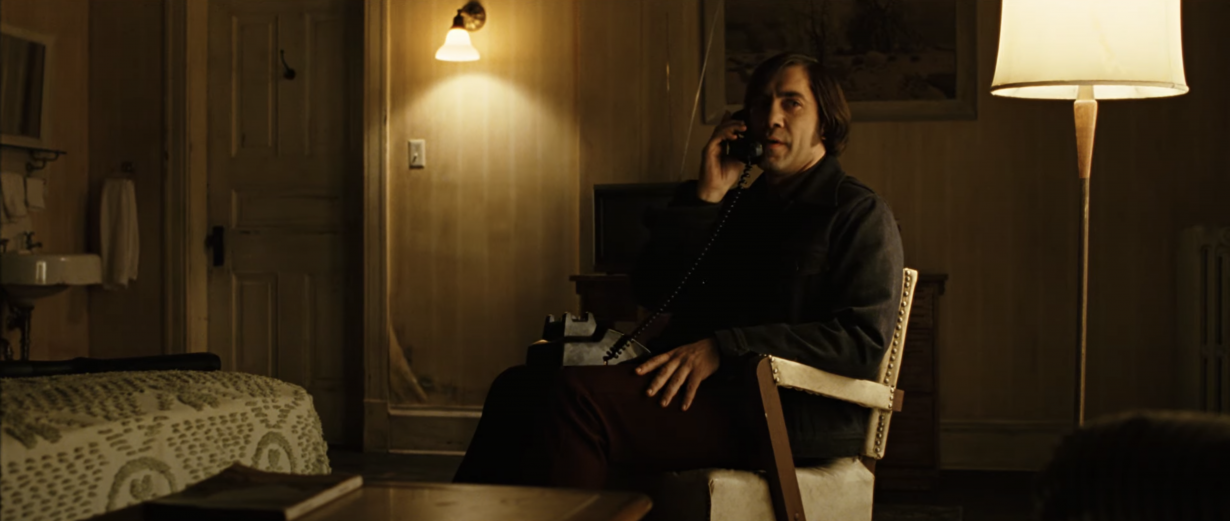
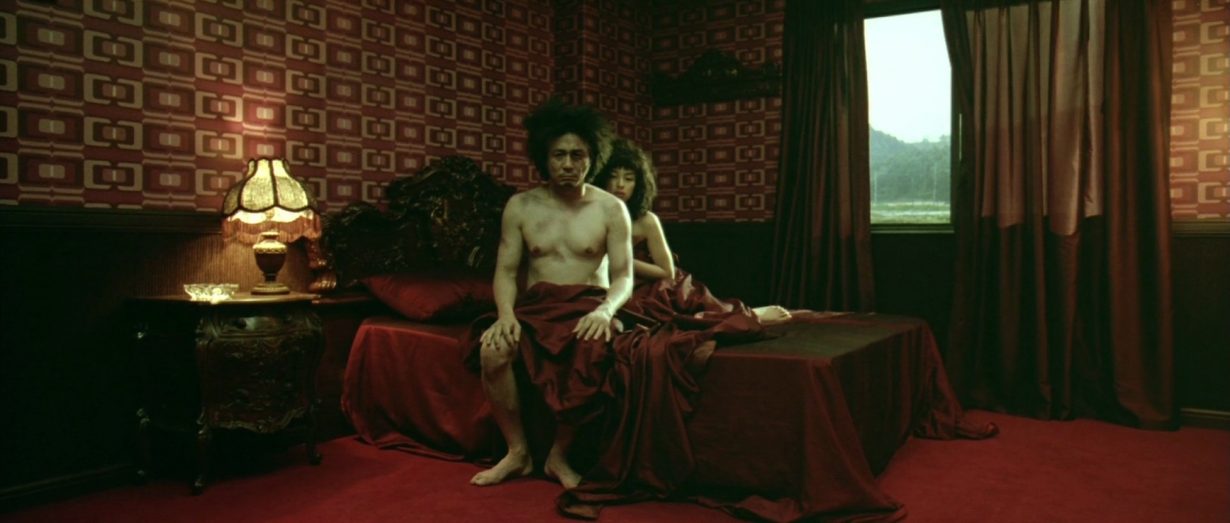
Occasionally, though, the game reaches for a more traditionally cultured tone. You’re instructed to look at a painting of tigers – contented beings, opines your companion, who just “live and rest”. But “we don’t get that”, he says. “We get minds that torture us.” Another appears to be Bernardo Strozzi’s Tobias Curing His Father’s Blindness (1630–35), depicting the archangel instructing Tobias to cure his father using the gall of a fish. Are we the blind man, seeing the world at last in full view – is our instructor Tobias, lifting the veil? Or are we the fish, splayed out and open on a table, mouth hung ajar as if in ecstasy? “It feels like it shouldn’t be here, like us,” our partner remarks on the painting; how depraved Clickolding’s pas de deux seems by comparison.

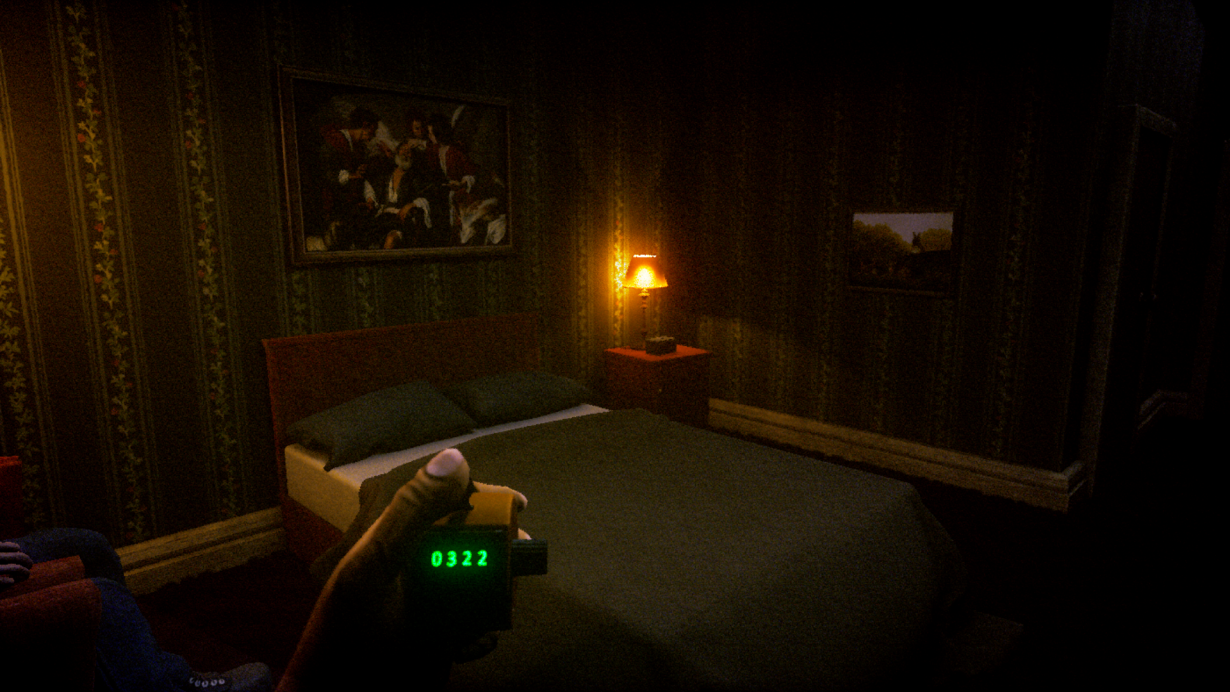
The restlessness that pervades Clickolding feels as much a commentary on videogames as the wider realm of interfacing with technology, be that our phones, smart watches or Alexa devices. In pushing the tally counter to its maximum input of 10,000, we possess the perverse Lacanian desire to consume it, to consummate it, to dominate it, and thus invest it with a kind of libidinal energy. The game reflects our rather miserly sexual moment that the writer Magdalene J. Taylor ascribes to declining sex, rising loneliness and widespread depression, when the transfer of libidinal energy happen less between people, and more between people and machines. More than that, it gives an opportunity to enact and frustrate our own libidos, and, just as a videogame should, play with it.
In Clickolding, the tally counter is an object both we and our menacing partner-in-crime are able to project desire onto, and an object that we are both entirely captured by. On my 10,000th click, I had no moment of epiphany, nor release: just a desire to keep chasing the dragon as one might with any other drug: sugar; coffee; heroin. I swapped the game’s tally counter for my laptop trackpad, and continued to click compulsively. Later, I moved onto my phone, tapping (rather than clicking) with my finger until the very moment I fell asleep. Where technology companies have cultivated, and capitalise on, our arguably libidinous addiction to their machines, there is an admirable honesty to Clickolding: there’s no obfuscation here; the psychosexual connection is explicit.
The elegance of Clickolding, indeed the sordid beauty of it, is that the game understands what the tally counter is: a physical object, yes, which also occupies a psychic space. Like an intolerable itch, it sits at the root of a chain of desire – carnal, psychological, technological – which may never be wholly satisfied.
Lewis Gordon is a UK-based writer on technology and culture. His writing has appeared in New York Magazine, The Verge and The Nation, among others.
